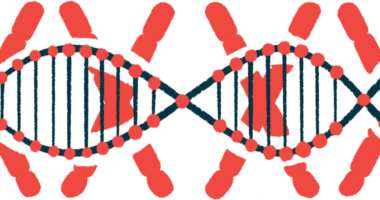Entrada Selects Exon 45-skipping Therapy Candidate for DMD
Company to seek FDA approval in 2024 for clinical testing of ENTR-601-45

Entrada Therapeutics has selected ENTR-601-45 as an investigational therapy candidate for people with Duchenne muscular dystrophy (DMD) who have mutations amenable to exon 45 skipping.
The company is planning to file an Investigational New Drug application in the second half of 2024. These applications are used to request regulatory authorization to begin clinical testing of an experimental therapy.
“There is a profound unmet need for people living with Duchenne and the more than 1,300 people in the US and Europe who are exon 45 skipping amenable,” Dipal Doshi, president and CEO of Entrada, said in a company press release. “We believe that our portfolio of [therapeutic] candidates has the potential to provide a transformational impact for these individuals and their families.”
DMD gene mutations disrupt the production of functional dystrophin protein
DMD is caused by mutations in the DMD gene that disrupt the production of functional dystrophin protein. Because dystrophin is important for muscle health and function, people with these mutations experience progressive muscle degeneration.
The process involves the creation of messenger RNA (mRNA), which carries the gene’s information to the cell machinery that builds proteins. Genes such as DMD consist of alternating pieces of genetic code called exons and introns, with exons containing the instructions to build proteins. Because of this, mRNA is first cut to remove introns and then reassembled, a process called splicing, to create a string of exons ready for protein production.
DMD mutations can cause one or more of these exons to be missing. This absence might cause other exons not to fit together properly during splicing, leading to impaired, or fully disrupted, dystrophin production.
Exon-skipping therapies such as ENTR-601-45 can make cells skip over one or more exons that do not fit properly during mRNA splicing, allowing the remaining exons to be properly attached and a shorter but still functional version of dystrophin to be produced.
ENTR-601-45 was designed to allow skipping of exon 45 of DMD, which can be beneficial for about 8% of DMD patients. The therapy candidate uses Entrada’s proprietary Endosomal Escape Vehicle (EEV) technology, which enables efficient intracellular delivery and avoids the cell’s natural degradation system.
There is a profound unmet need for people living with Duchenne and the more than 1,300 people in the US and Europe who are exon 45 skipping amenable
ENTR-601-45 selected as therapy candidate based on promising early data
Entrada selected ENTR-601-45 as a therapy candidate on the basis of promising in vitro (in the lab) and in vivo (in living animals) results. In skeletal and cardiac muscle cells derived from patients, ENTR-601-45 was able to induce exon 45 skipping and increase dystrophin levels. In a mouse model of DMD, a single into-the-vein dose of the therapy led to high levels of exon skipping in skeletal muscle, with efficacy also seen in cardiac muscle.
Of note, Amondys 45 (casimersen), a treatment developed by Sarepta Therapeutics for people amenable to exon 45 skipping, received conditional approval from the U.S. Food and Drug Administration (FDA) in early 2021. According to Entrada, ENTR-601-45 led to exon skipping levels equivalent to those seen at double the dose of a casimersen sequence conjugated to an EEV.
The company plans to present more supporting data for ENTR-601-45 at the upcoming Muscular Dystrophy Association Clinical & Scientific Conference, scheduled for March.
“[We] look forward to continuing to expand our pipeline of therapeutics for those in the Duchenne community,” Doshi said.
Another investigational therapy in the company’s pipeline is ENTR-601-44 for DMD patients who are amenable to exon 44 skipping. Entrada has submitted an Investigational New Drug application for that treatment, but the FDA decided to place the application on hold.







